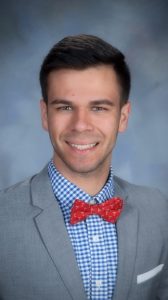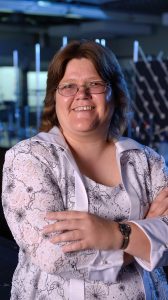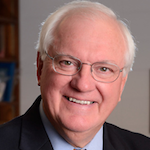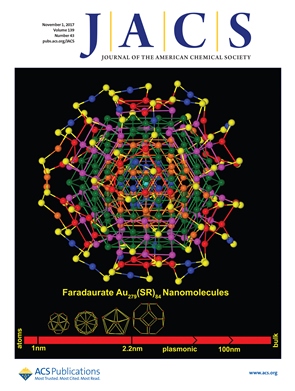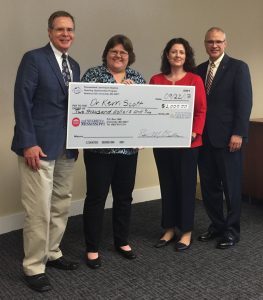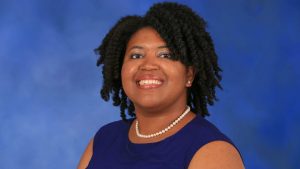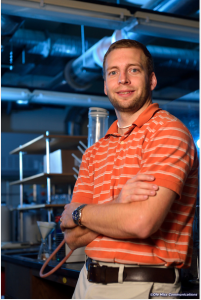
Dr. Anna Marie Hailey-Sharp and her staff, medical assistant Robyn King and nurse Shelly Goforth
PRESTON — When Dr. Anna Marie Hailey-Sharp was growing up in rural Preston, there was no such thing as a quick trip to the doctor. Her pediatrician worked in Meridian, one hour away. So she didn’t see a doctor unless she really needed to.
Unfortunately, Haley-Sharp, who had asthma as a child, needed to see her doctor a lot. So on Fridays after school, she and her mom would pile into the Ford Explorer and drive to Meridian for her weekly allergy shots — two hours, round trip. Sometimes, if her asthma started acting up, her whole family would make the trip in the middle of the night.
“We were back and forth to Meridian for years,” Hailey-Sharp said. “I don’t think we really thought that much about it at the time. It’s just the way things were. You got so used to going to Meridian for stuff that it just became a way of life.”
But for Preston’s residents, this way of life may be on its way out. In late 2015, not long after she had finished her medical residency, Hailey-Sharp opened a family medicine clinic in Preston, making her the first doctor to practice in this one-stop-sign town.
But if Hailey-Sharp’s decision to set up shop in one of Mississippi’s most rural corners was unusual, it was far from a surprise. As one of the first graduates of Mississippi’s Rural Physicians Scholarship Program, she had committed to returning to Preston before she even committed to a specialty at the University of Mississippi’s medical school.
At a time when rural hospitals around the state are struggling to stay open amid financial and regulatory burdens, Mississippi’s rural physicians scholarship program is trying to put more doctors to work in underserved parts of the state by targeting students from rural communities willing to return home to practice.
“Really our program is about continuity of care, people being able to make a difference in the overall health care of a community because they’re building these consistent relationships with their patients,” said Wahnee Sherman, executive director of the Rural Physicians Scholarship Program.
There’s little question Mississippi needs more doctors. The state averages just 184 physicians for every 100,000 residents, fewer than any other state in the country. The problem is particularly stark in the rural parts of the state. In 2013, 21 of Mississippi’s 82 counties had four or fewer primary care physicians, according to the Department of Health. Two of those counties, Carroll and Issaquena, had zero.
“The difficult places are the rural and impoverished parts of the state,” said Dr. Randy Easterling of the Mississippi Board of Medical Licensure.
Over the course of the next decade, Mississippi’s Rural Scholars Program has the potential to put nearly 200 young doctors to work in small towns across the state. This year, 19 first-year medical students joined the program.
But needing something doesn’t always translate to using it once it arrives. Old habits die hard, and like Hailey-Sharp, many Preston residents don’t think twice about driving an hour to go to the doctor.

Ryan Kelly, executive director, of the
Mississippi Rural Health Association
The survival of these rural health clinics depends on strong community support, far more than clinics in urban settings, according to Ryan Kelly, executive director of the Mississippi Rural Health Association.
“Their census is always a challenge,” Kelly said. “They are in places with a low population and in order to make money to survive, they have to have that certain number of patients.
“There’s still the mentality in places that it is a lesser quality of health care, but that’s the furthest you can get from the truth,” Kelly said. “It’s really high quality health care. They have the same requirements as everyone else. They simply operate in an area where there’s not health care.”
Preston, an unincorporated community in Kemper County, is small, even by small-town Mississippi standards. Its few businesses sit within sight of each other, the lone exception being Hailey-Sharp’s clinic, tucked into two double-wide trailers behind the volunteer fire department.

Larrison Campbell, Mississippi Today
Rush Medical Clinic in Preston
On a recent afternoon, Hailey-Sharp is on the phone at her desk. Her voice, light but authoritative, fills every corner of the small office.
“I wanted to let you know your CT scan didn’t show anything other than a hernia. But I’m going to make you an appointment with a surgeon. Your daughter was telling me you used Dr. Ward for your colonoscopy …”
She trails off, listening to the patient. “Okay, alright. You tell me when’s good for you.”
Since Hailey-Sharp began her practice, she has acquired a reputation for one thing in particular: She makes her own calls, a task usually left to nurses and medical assistants.
“It’s just quicker for them to ask me questions than it is for them to ask someone else who then has to ask me,” Hailey-Sharp said.
Hearing this explanation, however, Hailey-Sharp’s staff laughs. Her nurse, Shelly Goforth, has more than a decade of experience. Doctors, she said, don’t call their patients.
“Even if their labs are normal, she’s going to call them. And that’s something that even myself, with my years in health care, I haven’t experienced that.” Goforth said. “It’s like normally you call the doctor’s office, you call them and call them. And they’re saying, ‘Well, if there’s anything wrong we’ll let you know.’ And you’re like, ‘No – I still want to know!’”
The Rural Physicians Scholarship Program began slowly, with its first student entering practice in 2012. Hailey-Sharp, who finished her residency in 2015, had only three other rural scholars in her class.
Potential scholars don’t have to be from a rural part of the state, but they do have to be from Mississippi and attend one of its two medical schools, the University of Mississippi and William Carey University in Hattiesburg, which has a doctor of osteopathy program. And they need to know what they’re getting into.
“They have to understand what rural Mississippi means,” Sherman said. “They need to have a substantial experience from a rural area, whether it’s grandparents or other family.”
The rural physicians program requires its students to commit to one year of practice in their chosen community for each year they received the scholarship. But Sherman admitted the goal is for doctors to stay permanently. This is why community ties are so important, since rural areas don’t have much in the way of shops or restaurants to attract out-of-towners.
“The fact is you don’t always recruit physicians, you recruit their wives or husbands, and a lot of wives want to live in Northeast Jackson and they want to send their kids to the best schools. And I can sympathize with that,” Easterling said.
Preston doesn’t even have a school — kids in town take the bus to DeKalb, the county seat.
Still, the Rural Physicians Program made a smart bet with Hailey-Sharp. She joined the program as a second-year medical student, meaning she’s obligated to practice three years in Preston. And more than halfway through, she doesn’t have plans to leave.
Her husband is from the area, too. Many of her patients know her mom and knew her dad, who passed away this summer. And, she admits, some even use this to their advantage.
“If they can’t reach me they’ll call my mom,” Hailey-Sharp said. “But it’s not really an issue. No one abuses it. If they legitimately need something I would want them to tell me.”
Much as Preston itself differs from cities like Meridian or Jackson, the kind of medicine doctors here practice also differs from the kind practiced in bigger areas. And perhaps another reason these doctors need to know their communities is that not everyone is cut out for it.

Office assistant Heather Kenney
“There’s not a lot of doctors you can find anymore who actually care about what their patients need and what’s going on with them and try to find out why things are going on. And these patients really like that. They want someone who knows their lives and is going to take that time,” said Heather Kenney, Hailey-Sharp’s office assistant.
“I think that’s what’s bringing people here.”
On a recent Tuesday afternoon, David Barefield was planting watermelons in a field off of Route 397 with his son, Bobo. He has been using the Preston clinic since shortly after it opened, and, as he wiped the sweat from his brow, he grinned talking about his relationship with his new doctor.
“I like having the clinic here in Preston,” Barefield said. “The only trouble I have down there is calling her ‘doctor,’ because I’ve called her Anna Marie since she was a little girl. But it is super nice to be able to go down there and be done in the time it takes you to drive to another doctor.”
Not everyone in town has been as quick to convert, however. Les Henderson runs the Preston General Store, at the intersection of Highway 21 and Route 397. He is thrilled that Preston finally has a clinic. “It’s already boosted the economy by 25 percent,” he said and laughs. But he doesn’t have plans to use it anytime soon.
“I don’t hardly go to the doctor if I can avoid it,” Henderson said.
Of the one dozen Preston residents who spoke with Mississippi Today, almost all were excited about the clinic’s arrival. But fewer than half had actually used the clinic in the year and half since it opened.
This could pose a problem for the clinic. Preston is a small town, and survival is tough for any business without the full backing of the community.
Lance Brent is a vice president at Rush Health Systems, which operates the Preston clinic. Of the towns where Rush has its 19 rural health clinics, Preston is by far the smallest, he said. And he acknowledged that this carries a certain level of risk.
“And I don’t know that there is anything that alleviates that risk. I think we just took a chance and put it out there,” Brent said.
Brent said that Rush doesn’t set a target number of patients for its clinics but “20 a day would be great.” And he thinks the clinic, which currently sees about 14 patients a day, can eventually get there.
“She’s liked by the community, and with that I think that it’ll continue to grow,” Brent said.
And this points to what might be the biggest draw for the clinic — Hailey-Sharp, herself. She arrived in town with something few big city doctors can claim right out of residency: a great reputation.
Maebelena Smith has made several trips to the clinic in recent months. Even so, to her the new physician in town isn’t “doctor” or “Anna Marie,” but “Cecil Hailey’s granddaughter.”
“That’s what makes a lot of people come to her. They know her family and background. Her grandfather was a good man, he helped people when he could, and she’s got to be cut from the same mold,” Smith said. “She’s a very kind girl. And she’s a good doctor, too.”
Larrison Campbell writes about healthcare and some social issues for Mississippi Today. Email Larrison at larrison@mississippitoday.org.

